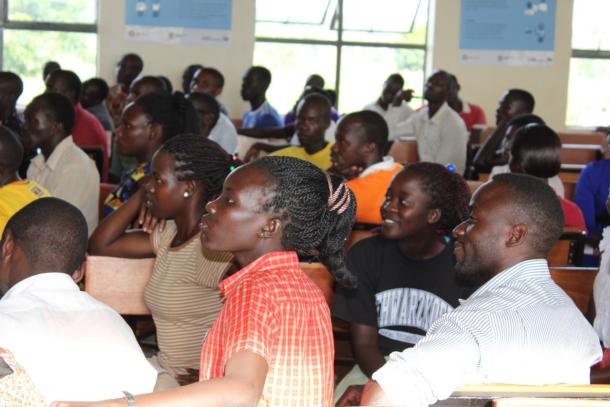First Africa Teachers Report Calls for Investing in Girls Education and Ending Child Marriage in Africa
Simone Yankey-Ouattara and Quentin Wodon
February 01, 2024
Simone Yankey-Ouattara is Acting Coordinator of the African Union’s International Centre for Girls’ and Women’s Education in Africa (AU/CIEFFA). Quentin Wodon is Director of UNESCO’s International Institute for Capacity Building in Africa (UNESCO IICBA).

While nine in ten girls complete their primary education and over three in four complete their lower secondary education globally, the proportions remain much lower in sub-Saharan Africa, where just over two-thirds of girls (69 percent versus 73 percent for boys) complete their primary education and four in ten (43 percent versus 46 percent for boys) complete lower secondary education according to the latest available data from the UNESCO Institute for Statistics. More needs to be done to improve educational opportunities for girls in Africa, which would help end child marriage and boost countries’ economic development. Gender imbalances in education and beyond (including in occupational choice and more broadly agency) result from deep-seated biases and discrimination against women, which percolate to education. It is therefore essential to reduce inequality both in and through education, acknowledging that education has a key role to play in reducing broader gender inequalities in societies.
This week UNESCO IICBA and the African Union’s International Centre for Girls’ and Women’s Education in Africa (AU/CIEFFA) jointly released a conference edition of the first Africa Teachers Report at an event organized by the Belgian Presidency of the European Union. The first part of this report updates and expands for a much larger number of countries a previous investment case on the benefits of educating girls and ending child marriage also co-sponsored by AU/CIEFFA. The second part looks at the role of teachers and school leaders in improving learning outcomes and educational attainment for girls. The report was published support from the European Union under its Regional Teachers Initiative for Africa.
Key findings on the benefits from educating girls and ending child marriage in the first part of the report include the following:
- Gains in earnings are substantial especially with a secondary education. Women with primary education earn more than those with no education, but women with secondary education earn more than twice as much. The gains with tertiary education are even larger.
- Each additional year of secondary education could reduce the risk for girls of marrying as a child and having a child before 18. Universal secondary education could virtually end child marriage and reduce early childbearing by up to three-fourths. By contrast, primary education in most countries does not lead to large reductions in child marriage and early childbearing.
- Universal secondary education and ending child marriage could reduce total fertility (the number of children women have over their lifetime) nationally by a third on average across countries, reducing population growth and enabling countries to benefit from the demographic dividend.
- Universal secondary education could also have health benefits, including (i) increasing women’s knowledge of HIV/AIDS by one-tenth; (ii) increasing women’s decision-making for their own healthcare by a fourth; (iii) reducing under-five mortality by a third; and (iv) reducing under-five stunting by a fifth. Other benefits include among others a reduction in intimate partner violence.
- Universal secondary education could also increase women’s decision-making in the household by one-fifth and the likelihood that children would be registered at birth by over a fourth.
- While primary schooling is necessary, it is not sufficient. For most indicators or domains of potential impacts, gains associated with educational attainment tend to be substantial only with secondary education or higher. Secondary education is also needed to help end child marriage.
- Gender inequality, starting with inequality in and through education, is massive, with women accounting for only a third of lifetime labor market earnings in sub-Saharan Africa. The gap between men and women in human capital wealth (the value today of the future earnings of the labor force) is estimated at US$ 4.0 trillion in 2018 values. Reducing gender inequality, including through education, could dramatically improve countries’ development prospects.
- Overall, while educating girls and ending child marriage is the right thing to do, it is also a smart economic investment. This statement is not new, but the contribution of the first part of the study is to provide estimates of the benefits of educating and ending child marriage in Africa for a much larger number of countries and with more recent data than done previously.
The second part of the report focuses on the role of teachers and school leaders in educating girls and ending child marriage, arguing that: (1) Lack of foundational learning is a key factor leading to drop-out; (2) Teachers and school leaders are key to improving foundational learning; and (3) Professional standards and competencies for teachers and school leaders are required. These three findings call for investing in teachers and school leaders, especially women, to educate girls and end child marriage. Topics such as gender-responsive pedagogy and gender-based violence are also discussed in the report.
The report is part of an expanded collaboration between UNESCO IICBA and AU/CIEEFFA across Africa for the African Union Year of Education 2024, including joint projects that will be discussed in future blogposts. The report also contributes to the African Union’s advocacy campaign, #AfricaeducatesHer, launched in September 2020 to rally African Union Member States to safeguard girls’ education in Africa and ensure that girls continue learning during and post the COVID-19 related school closures and disruptions.

